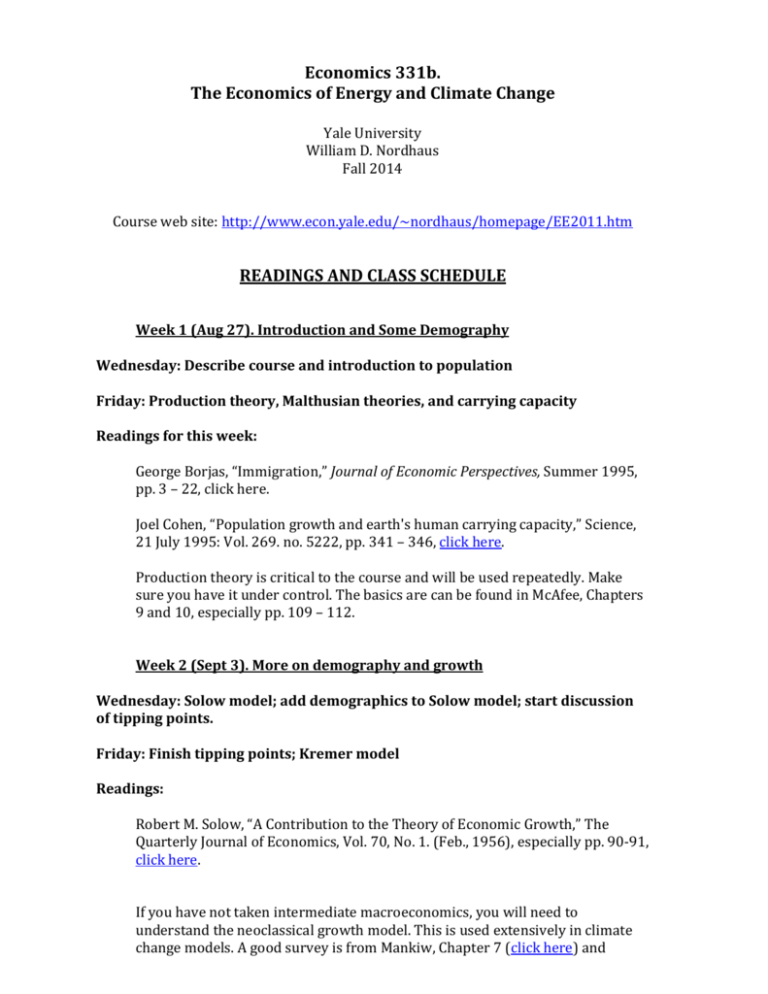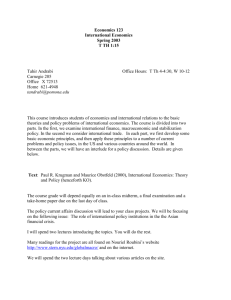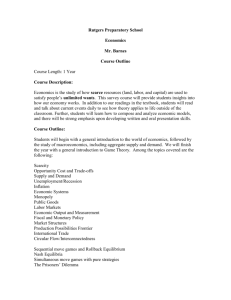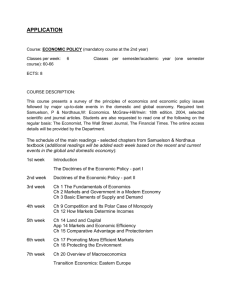Assignments_331_2011S_first_v3
advertisement

Economics 331b. The Economics of Energy and Climate Change Yale University William D. Nordhaus Fall 2014 Course web site: http://www.econ.yale.edu/~nordhaus/homepage/EE2011.htm READINGS AND CLASS SCHEDULE Week 1 (Aug 27). Introduction and Some Demography Wednesday: Describe course and introduction to population Friday: Production theory, Malthusian theories, and carrying capacity Readings for this week: George Borjas, “Immigration,” Journal of Economic Perspectives, Summer 1995, pp. 3 – 22, click here. Joel Cohen, “Population growth and earth's human carrying capacity,” Science, 21 July 1995: Vol. 269. no. 5222, pp. 341 – 346, click here. Production theory is critical to the course and will be used repeatedly. Make sure you have it under control. The basics are can be found in McAfee, Chapters 9 and 10, especially pp. 109 – 112. Week 2 (Sept 3). More on demography and growth Wednesday: Solow model; add demographics to Solow model; start discussion of tipping points. Friday: Finish tipping points; Kremer model Readings: Robert M. Solow, “A Contribution to the Theory of Economic Growth,” The Quarterly Journal of Economics, Vol. 70, No. 1. (Feb., 1956), especially pp. 90-91, click here. If you have not taken intermediate macroeconomics, you will need to understand the neoclassical growth model. This is used extensively in climate change models. A good survey is from Mankiw, Chapter 7 (click here) and Chapter 8 (click here). You need to understand particularly sections 7-1 and 81. Michael Kramer, “Population Growth and Technological Change: One Million B.C. to 1990,” The Quarterly Journal of Economics, Vol. 108, No. 3. (Aug., 1993), pp. 681-716, click here. You should study carefully pp. 681-687 and the conclusions (pp. 712-714). Timothy Lenton et al., “Tipping elements in the Earth’s climate system,” PNAS, 2009, 106:20561-20563, click here. For the mathematically inclined and interested, the “Tipping points: mathematical appendix,” pp 1 – 5, click here. Week 3 (JSept 8). Exhaustible Resources and Oil Monday: Energy Primer (see lecture notes for slides and Primer) Wednesday: Economics of exhaustible resources: Hotelling v. Hubbert Friday: How to use Excel Solver (critically important lab for those who don’t know) Readings: Energy primer: Part of understanding energy and climate change is the basics of the industry, energy use, measurement, etc. This is the IPCC primer, click here. Also, you can look at my notes on the lecture notes, which is less technical but maybe more fun. On exhaustible resource theory: This is extremely important. Hotelling pricing of exhaustible resources is one of the most important ideas in all resource economics. Robert M. Solow, “The Economics of Resources or the Resources of Economics,” The American Economic Review, 1974, click here. Harold Hotelling, “The Economics of Exhaustible Resources,” QJE, 1931, click here. This is an absolutely brilliant article. Read through p. 146 and skim the section on taxation. On the peak oil hypothesis: This is a fiery controversy largely devoid of much economics. You can look over some of the following. We need to think about what economics would have to say about all this. The Hubbert curve, click here for the Internet reading (Sorry, can't find a better one. This is long but extremely influential.) The Department of Energy experts’ report (http://www.eia.doe.gov/pub/oil_gas/petroleum/feature_articles/2004/world oilsupply/oilsupply04.html ) The CERA report (they are a premier consulting group) at http://www.cera.com/aspx/cda/public1/news/pressReleases/pressReleaseDe tails.aspx?CID=8444 . Week 4 (Sept 15) Monday: Hotelling v. Hubbert continued Wednesday: The Economics of an Integrated World Oil Market Reading: William Nordhaus, “The Economics of an Integrated World Oil Market,” paper for the International Energy Workshop, June 2009, available at http://www.iccgov.org/iew2009/4-2-c-1.htm or click here. For a history of the law of one price, see Karl Persson, "Law of One Price" EH.Net Encyclopedia, edited by Robert Whaples. February 10, 2008. URL http://eh.net/encyclopedia/article/persson.LOOP Friday: Optional discussion session. From time to time, I will have an unstructured session in which we can discuss more general questions that have come up in recent lectures. I will not prepare anything, so you should come prepared. ... Week 7 (Oct 6). Introduction to climate science Monday. Hour test in class







